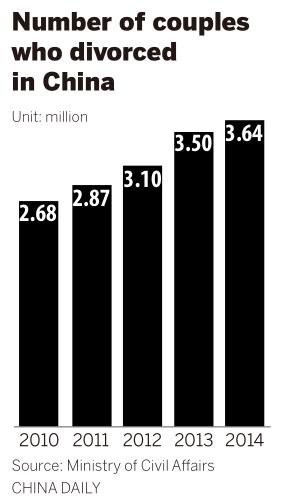
Beijing banker Zheng Hong has taken on a new role at a court in Beijing as a mediator in family disputes.
She has been working at Dongcheng District People's Court since the start of June helping judges to deal with domestic cases including divorce, child custody and property inheritance.
Her new role is part of plans to reform hearings into such cases that were put forward by China's top court in May.
The court where Zheng works is one of 118 nationwide taking part in a two-year pilot program to offer free mediation services, partly to reduce the burden on the legal system.
In addition to offering mediators, participating courts will provide social workers and psychologists, enabling potential litigants to solve conflicts without necessarily resorting to the courtroom.
The number of mediators working at Dongcheng District People's Court and the 117 others taking part in the pilot program is not known, and the numbers are likely to change as the program takes shape.
According to the Ministry of Civil Affairs, the national divorce rate has risen rapidly since 2002, with 3.64 million couples ending their marriages in 2014. Most of those getting divorced were born in the 1980s and 1990s.
Zheng, 46, said her role is to mediate between couples embroiled in domestic conflicts before their cases come before the courts.
"If my mediation contributes to alleviating family disputes and results in people deciding not to resort to the courts, this will be more harmonious for the family members and should also reduce the burden on legal resources," she said.
"Many domestic cases result from people acting on impulse, especially divorces. We should provide them with a period in which they can calm down."
Zhao Qing, chief judge at the Dongcheng court's family dispute tribunal, said a 66-item plan was put into operation after the Supreme People's Court called for the reforms.
Residents with mediation experience, such as seniors working on community committees, and people with knowledge of the law and psychology are being selected as mediators, Zhao said. Training will be offered.
Under the plan, family disputes will initially be handled by mediators within three days of being registered with a court.
Potential litigants will be allowed to choose the mediators they want to work with — in line with their needs. The mediation process should last a maximum of three months.
"We did some mediation in the past," Zhao said. "But with divorce cases booming, we need to send more work to mediators and hope they can play a bigger role in family litigation.
"We judges will be free to spend more time studying legal problems in cases and dealing with marriages in which couples' conflicts cannot be mediated, such as those involving domestic violence."
While the pilot program is just starting in many areas, courts in Fujian province have relied on mediation for some time in connection with family disputes.
For example, Sanming Intermediate People's Court has used mediation in many cases involving young people and domestic disputes since last year. It also provides psychologists.
Guo Jie, a judge at that court, said, "The combination is inevitable, as many divorces involve children and child-raising disputes."
Last year, the court heard 1,001 divorce cases that involved minors. These comprised 68.2 percent of the total number of divorce cases heard by the court in 2015, Guo said.
"Psychologists can also help children to cope with their parents' divorces, and they offer psychological tests for adults," she said, adding that about 80 psychologists now support family case hearings in the city's courts.
Guo said the move toward increased mediation in such disputes and less time spent in courts stems from the experience in countries such as the United States.
